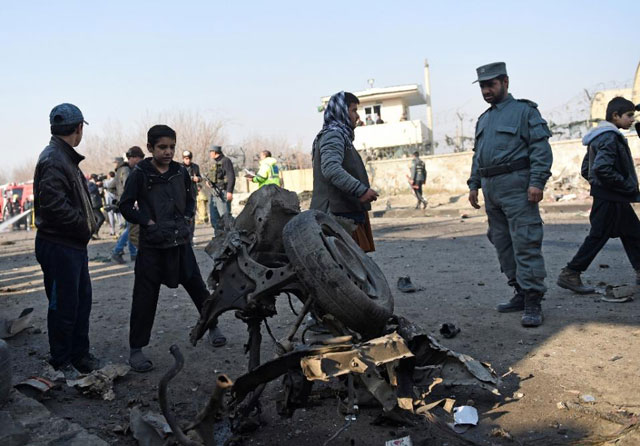
Thirteen other civilians were wounded in the early morning assault, which occurred amid a worsening security situation in Afghanistan as the Taliban step up their nationwide offensive.
The explosion, which left a wreckage of mangled and smouldering vehicles, comes despite a renewed international push to jumpstart stalled negotiations with the insurgents.
"The bombing left at least one civilian dead and 13 others wounded," Kabul police spokesperson Abdul Basir Mujahid told AFP.
The Afghan interior ministry said the target appeared to be a NATO convoy. In a brief statement, the international military coalition said it was investigating the incident.
Taliban spokesman Zabiullah Mujahid said the insurgents were behind the suicide attack on a foreign forces convoy, claiming that "several invading forces were killed and wounded".
The Taliban are known to exaggerate battlefield claims.
The attack comes a day after army chief visited Kabul in a bid to prepare the ground for fresh peace talks with the Taliban.
"Both sides agreed that the first round of dialogue between Afghanistan, Pakistan, US and China will be held in January to lay out a comprehensive roadmap for peace," the Afghan presidential palace said in a statement.
Afghan Taliban bomber kills six NATO troops as violence rises
Director General Inter Services Public Relations (ISPR), Asim Bajwa said on Twitter that the talks will be held in the first week of January, but did not disclose the venue.
There was no immediate reaction from the Taliban to the announcement of the four-party talks.
Pakistan -- the Taliban's historic backers -- hosted a milestone first round of talks in July but the negotiations stalled when the insurgents belatedly confirmed the death of longtime leader Mullah Omar.
Afghanistan sees the support of longtime nemesis Pakistan as vital to bring the Taliban to the negotiating table.
But despite the growing bonhomie, analysts caution that any substantive talks are still a long way off.
Afghan forces are currently battling to push out Taliban insurgents who seized large swathes of the key opium-rich district of Sangin in southern Helmand province.
Observers say the intensifying insurgency highlights a push by the militants to make more military gains in a bid to wrangle greater concessions during talks.
Afghan officials pin hopes on Gen Raheel’s visit
The offensive has prompted the first British deployment to the volatile province in 14 months.
The deployment, in addition to a recent arrival of US special forces in the region, comes a year after NATO forces formally ended their combat operations in the country.
The British and US intervention has fuelled the perception that foreign powers are increasingly being drawn back into the conflict as Afghan forces struggle to rein in the Taliban.

1731914690-0/trump-(26)1731914690-0-165x106.webp)















COMMENTS
Comments are moderated and generally will be posted if they are on-topic and not abusive.
For more information, please see our Comments FAQ